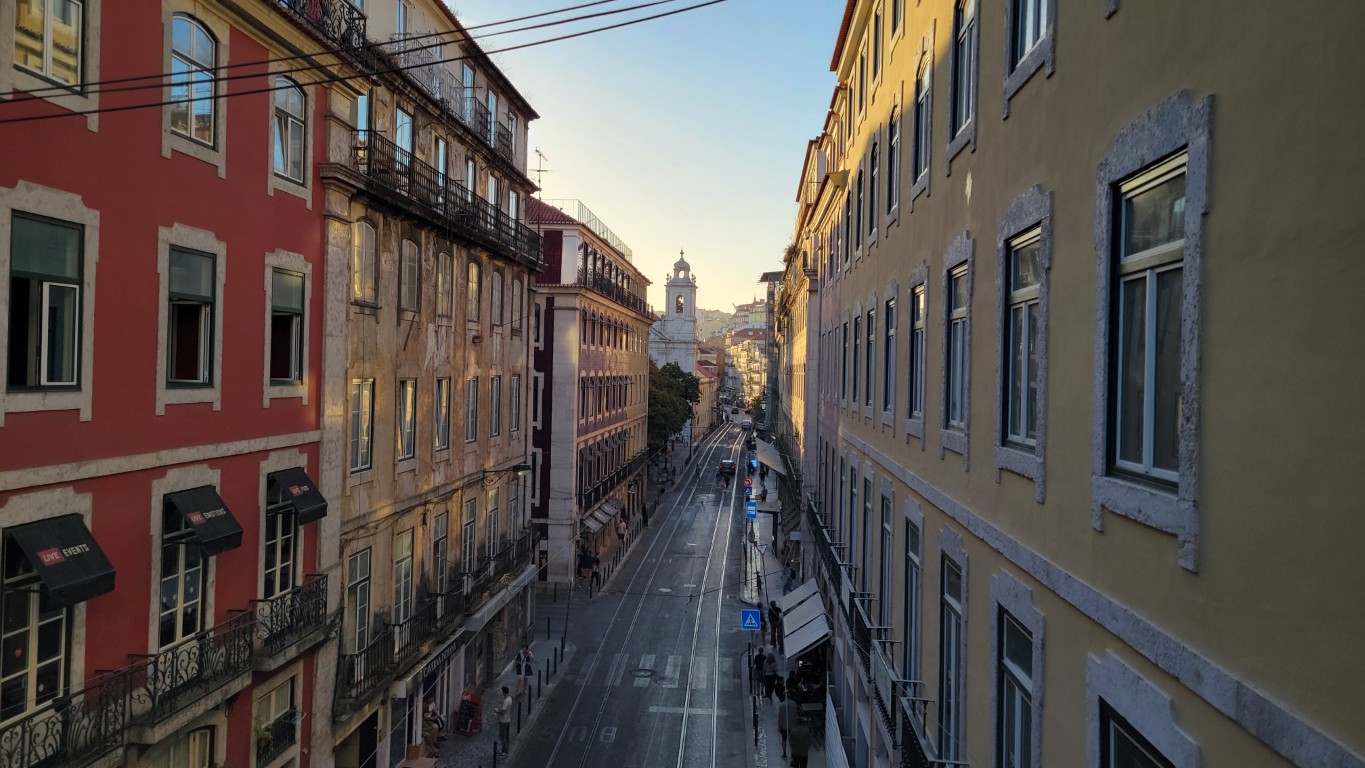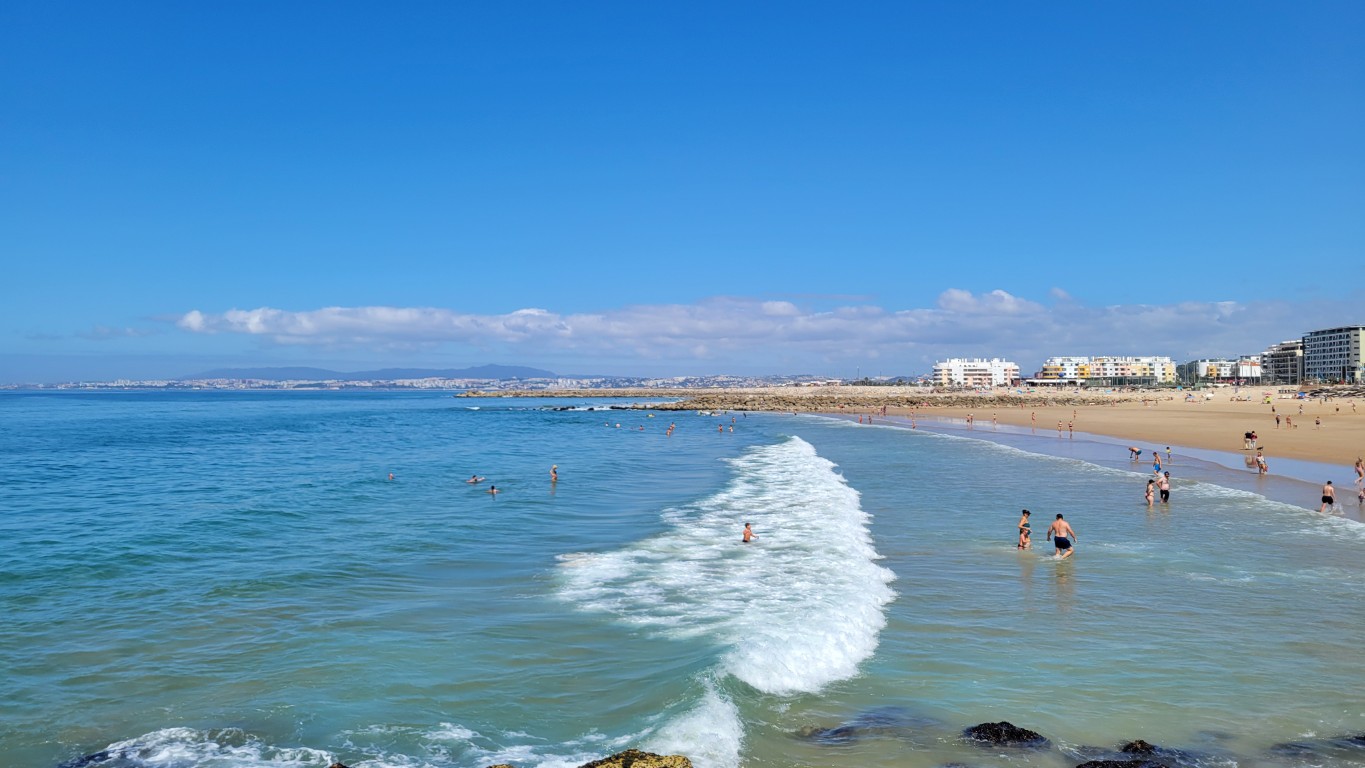Anyone who's visited Lisbon will tell you that it's a little bit magical. After a year here, I have to agree.
I love it all, from the Lisbon Oceanarium to Parque Eduardo VII, from Praia de Santo Amaro to Castelo do São Jorge. I love the slower pace of life, the delight in little things, and the higher-than-average possibility of stumbling across some Roman ruins on your walk home.
All of these contribute to Lisbon's popularity among American immigrants, and for good reason. It's an international city with cheap flights from the East Coast (check out TAP Portugal!) and beautiful weather. It's also easy to get around with only basic Portuguese.
I've now lived just over a year in Lisbon city center, and I can't imagine leaving. If you're looking to explore Lisbon as a good quality option for your next home, here's a quick look into what my life looks like.
Short on time? Here's the cheat sheet:
💭Living in Lisbon is ideal for those looking for a historic and unique European city to call home.
🏠I recommend you consider moving to the Lisbon neighborhoods of Campo D'Ourique, Graça, Alcântara, or Santos.
🤕Don't rely on luck alone. SafetyWing now offers 2 types of Nomad Insurance coverage options: Essentials for travelers and Complete for expats and digital nomads.
🛂Most non-European foreigners who move here are on the D-class visas (includes a digital nomad visa, passive income visa, and entrepreneurship visa).
💰Cost of living is relatively low but consistently increasing. Earn travel rewards on all expenses with a Capital One Venture Card.
📞Save the hassle of getting a local SIM or the cost of roaming with Airolo, an e-SIM that’ll have you connected from the moment you arrive.
☂️Although you should be aware of the growing issues thanks to so many foreigners choosing to move to Lisbon,
🏖️there are ways to mitigate your negative impact and settle into a nice life in Lisbon.
What Is Living in Lisbon Like?

Portugal is the oldest country in Europe, and its history is everywhere. It's a huge part of what drew me to Portugal's capital over other Western European cities.
The weather is mostly sunny but not always hot, and the city is similar to San Francisco in its climate, its famous trolleys, and its April 25th Bridge, which is the sister bridge to the Golden Gate (don't call it by the wrong name!).
Lisbon offers a vibrant nightlife in the center of the city, with an amazing, affordable food scene, fun nightclubs and bars, and a full month of street festivals in June.
It's made even better because it's such a famously safe city, making it a fun place to walk around even in the early hours of the morning. I've found that this safety is what has afforded me the most opportunity as a solo female traveler: I'm able to explore the vibrant culture around central Lisbon almost every day, without getting nervous when the sun goes down.
Great Weather, Beautiful Beaches
Lisbon is technically on the river, not the beach. Still, it's only about a 30-minute train or Bolt ride (Bolt is like Uber here) to some of the most gorgeous beaches on earth. I highly recommend Costa da Caparica, Estoril, and Cascais for some lovely beach days—just make sure you bring an umbrella, as the sun can really beat down on a hot day.
Cost of Living in Lisbon

Finding an Apartment
Although Lisbon has seen a spike in the cost of living in the past few years (largely due to so many expats), it remains one of the more affordable European capitals to live in. Lisbon rents have shot up to an average of €1300/month for a one-bedroom. I pay about €900 for a 1-bedroom on the outskirts of the city, including utilities, which is about €300 less than I was paying in my own city of Portland, OR.
The most common site for rental apartments is Idealista, but I've actually found more success by joining "apartment-hunting" Facebook groups like these. Make sure you're being careful as you search for an apartment: like in most European cities, there are scams out there. Don't ever pay money upfront, and make sure you have a contract that you can verify with your local tax office.
Best Areas to Live in Lisbon
Some popular areas to live in the city are:
- Campo D'Ourique
- Principe Real
- Lapa
- Graça
All of these are in the city center without being smack in the middle of the touristy areas.
For more affordable options, check out neighborhoods toward the edges of the city, like:
- Alcântara
- Amadora
- Odivelas
If you want to be right in the middle of all the action, try Santos or Bairro Alto.
A quick note: I don't recommend that foreigners live in the historic Alfama neighborhood. It's heavily gentrified by foreign expats, with many families who'd lived there for generations being forced out. Visit and appreciate, but don't contribute to the problem.
Other Costs
Food can be extremely affordable in Lisbon if you're strategic. I spend about €50 per week on groceries and eat at restaurants once or twice on the weekends.
I'm told there are a couple of really good international schools here, too. If you have kids, consider Lycée Français Charles Lepierre or Carlucci American International School.
Like many people in Lisbon, I don't have a car. I get around almost exclusively by public transport, which is really easy to use, and costs a flat €40 for a monthly pass. I prefer this method, not only because I was used to going car-less in my previous life, but also because gas can be pretty expensive at €1.74/litre (more than $6/gal). When I have a longer journey, I grab a Bolt. For longer trips across Portugal and all the major villages throughout the countryside, it's worth it to rent a car for a couple of days.
In general, though, prepare to walk a lot. Most of the major sites are within walking distance of each other, and Lisbon, like most major European cities, is pretty dense. It was also built on seven very steep hills, which makes for beautiful views and some insane hamstring workouts. If you're preparing to make Lisbon your home, the Stairmaster is your friend.
Other Places to Move in Portugal
Although I love living in Lisbon, there are several great places to live throughout the country that you might also want to consider. Look into:
How to be a Digital Nomad in Lisbon's Capital City

There's a lot to consider when moving to Portugal, starting with the visa.
I moved to Lisbon on a D8 digital nomad visa, one of the many D-class visas for non-EU citizens. Other D-class visas include the D7 (the "passive income" visa) and the D2 ("entrepreneurship" visa). The D8 visa was created especially for people like me, who work remotely for an American company.
Applying for the visa can be a long, complicated exercise in Portuguese bureaucracy. It's best to prepare well, anticipate some hiccups, and (if you're able) hire someone to help. For the D8, you'll need to set up a Portuguese bank account and tax number (called a NIF), and find rental apartments or a long-term Airbnb. You'll also need at least a year of private health insurance.
Then, you'll need to have a VFS appointment at a Portuguese consulate in your home country. After that, you need to have another in-person appointment in Lisbon to change your visa into a residence permit.
I told you: complicated. My entire visa process took about 20 months, and I can't recommend enough that you get an immigration attorney to help.
What I Wish I'd Known Before Moving to Lisbon

Living in Lisbon has been a joy and a gift, but I haven't done everything perfectly.
I'd be remiss not to mention the crisis that American immigration has caused for Portuguese nationals—raising rents for Portuguese people and slowing down Portugal's national health service. As someone who has moved here, I want to be intentional about mitigating my impact (and potentially turning a negative impact into a positive one).
Here are some tips for you to do the same:
Learn Portuguese
If you're looking to move here, learning the Portuguese language goes a long way in building goodwill (even though most people in Lisbon speak incredible English).
Despite what you've heard, even very good knowledge of Spanish is not enough to get around in Portuguese. It is not the same. To make matters worse, the Lisboetta accent is pretty particular, so Duolingo won't give you what you need either (Duolingo only has Brazilian Portuguese, which is different).
Depending on your goals, I recommend these apps/platforms for language learning:
- Drops: Use the free version of this app for 5-minutes of vocab lessons a day. This is good for improving vocab but little else.
- Mondly: If you want to have a little bit more practice, this app is similar to Duolingo but has less silly prompts and more realistic phrases and sentences.
- Babbel: Babbel is similar to Mondly but also teaches cultural tidbits during the language lesson.
- iTalki: If you're more serious about learning to speak the language, this platform allows you to have 1:1 or group lessons with native teachers. This is especially helpful when it comes to getting accustomed to the Lisbon accent.
Tip Well
Tipping is not necessary or expected in Lisbon, but if you're American I still recommend you leave 1-2 euros extra on your tab. Portuguese salaries are some of the lowest of the EU citizen countries, and costs are largely going up because of people like us. The least we could do is leave a little extra on the bill.
Support Portuguese Companies
The city offers many incredible Portuguese options for food, drink, and entertainment. I always recommend choosing these over an international chain to support the local economy and for a more authentic experience.
Prepare for the Climate
Most places in the Lisbon Metropolitan area do not have central heating or air conditioning. This was probably the biggest culture shock for me as winter came along. Make sure you're prepared for the winter months, because houses can actually be colder inside than outside. Invest in some sweaters.
Invest in Private Medical Insurance
For the first year of your visa, you won't be able to use Portugal's national healthcare, so using private hospitals or clinics is a must. Regardless, I was able to find great insurance through Swift Express Capital, and have found that even private hospitals cost a fraction of my healthcare in the U.S.
Kat, the founder of A Way Abroad, always recommends SafetyWing. The choice is yours based on the specific coverage you're looking for but I recommend checking both before making a decision.
Amazing Country, Beautiful Life

Living in Lisbon has been one of the best experiences of my life, and not just because I'm writing to you from a terrace overlooking the Tagus River, from a neighborhood older than Rome.
The Portuguese capital city is an incredible choice for expat life: you get the rich history and charm, the excitement of being in a major capital city, and a more affordable cost of living than other European capitals like Paris or Berlin. It has welcomed me with open arms, and above all, I'd like to treat it as kindly as it's treated me.
If you're looking at EU countries to call home, or spending the next leg of your nomadic life in Western Europe, Portugal is my pick every single time. It's a place with a lot of love to give -- just make sure you love it back.









.png)
.png)